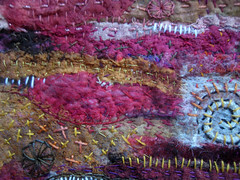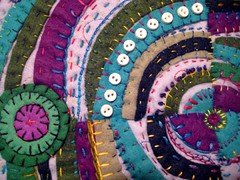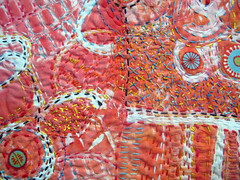 |
| detail of Venice ~ by Jane LaFazio |
 |
| detail of Pomegranate Jam ~ by Jane LaFazio |
 |
| detail of Recycled Circles ~ by Jane LaFazio |
 |
| detail of Orange Sherbet ~ by Jane LaFazio |
One of my favorite pastimes is adding hand embroidery to my fused art quilts. If you need a means to escape from your everyday woes, try hand stitchery. Your woes will fade away like a nasty rash after ointment is applied.
But like any treatment for woes you must begin with the right tools.
Matching the correct embroidery needle with your embroidery thread makes stiching a pleasure. Here's a handy chart to help you pair your long eyed embroidery needle with pearl cotton thread.
Pearl cotton thread is my choice for hand dyeing as well as for hand embroidery. With a slight sheen, this thread has the strength to hold up well when repeatedly drawn through fabric as a single strand. It also comes in a variety of sizes. Sizes 3, 5, 8, and 12 being my favorites.
 |
| size 3 thread (by Laura Wasilowski) |
A size 3 embroidery needle works best for your Size 5 pearl cotton thread.
Size 5 thread is traditionally used as embellishment for crazy quilts. For fusers, stitching through 1 or 2 layers of fused fabric is about the max with this thread. Couching is always an option with size 5 thread.
My go-to thread for fused art quilts is a Size 8 pearl cotton. It shows up well, stitches easily, and lends it's self readily to all those details you can't make with fabric. A size 4 embroidery needle is the perfect size for Size 8 thread although you can use a Size 3 needle as well.
 |
| size 9 thread (by Laura Wasilowski) |
For a delicate touch, use a Size 12 pearl cotton thread with a Size 5 embroidery needle. This thin thread works great on small fused elements and quickly stitches through layers of fused fabric. When I really want to escape my woes, I load up Size 12 thread.
+++++++++++
thanks Laura! I'm ordering a bunch of needles from you today, and I'm going to mark them by number.
thanks Laura! I'm ordering a bunch of needles from you today, and I'm going to mark them by number.
For more tips, visit Laura's Thread-u-cation Page on Laura's blog.
HOT summer blog hop giveaway continues over at Lyric Kinard's blog!
HOT summer blog hop giveaway continues over at Lyric Kinard's blog!



I have looked in amazement at all the blogs about hand embroidery and hand stitching. Just beautiful. But one question pops in my head that i haven't asked anyone yet and i thought i'd ask you.
ReplyDeleteNow i've cross stitched pillowcases before........yeah thats about the extent of it....lol...i always used a hoop to hold the piece in place while i stitched....do you do that??? Whenever anyone shows what they are working on they never show it in a hoop so i'm wondering. Do you just hold it loose and stitch on it? Isn't that difficult?? Anyway hope to hear from you....Beautiful work......Hugs! deb
Thanks so much to both of you for posting this - I have done different types of hand work over the years, but am only now doing freehand work, which means no kits. I absolutely LOVE the couching idea - gonna have to try that one soon!
ReplyDeletedeb, I never use a hoop. (I did when I worked from kits, and maybe it's because they didn't have any batting or stablizer on the cloth I was stitching) Now I usually have a thin batting behind whatever I'm stitching and a hoop would just get in the way. and no, it's not difficult at all!
ReplyDeleteI can never seem to get the needle right for my thread so this is a really useful post, thank you! And I love the work you've posted photos of, Orange Sherbet especially :)
ReplyDeleteThank you! I always just pick up thread and needles and hope for the best. It is great to get such clear direction and examples--now I am off to sort and organize so I can get to creating.
ReplyDeleteI'm here from LauraVille to check this out. Looks like a great resource to print out and add to my files.
ReplyDeleteThanks for posting this, I needed a hand stitching reminder.
ReplyDeleteLike the others, this was much-needed info for me too! Thank you. I am visiting from http://spillingmyheart27.blogspot.com/ ....... I love ALL crafts and have tried or will try just about any I find. I cannot wait to do some hand-stitching on some Art Journal Covers...and maybe some purses. I thought maybe I'd print out some of my art onto fabric and go from there. Whatdaya think? Can I post a linkback to you from my blog? Thanks again for sharing - Becky
ReplyDeleteThank you so much for sharing this information. I love hand stitching even though I have not done it for a while. This gives me inspiration to pick up needle and thread. Your works are lovely.
ReplyDeleteThanks so much for this post. I always enjoy your work - especially your stitching work. Great to see Laura's tips too.
ReplyDeleteYour handstitching is eye candy! One of my favourite things as a designer is beading on wedding gowns. I've bookmarked you on my blog for inspiration!
ReplyDelete:) Leigh
http://rubybarr.blogspot.com
Great job.
ReplyDelete